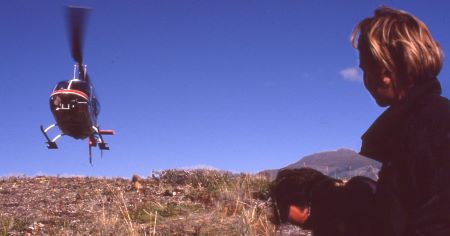
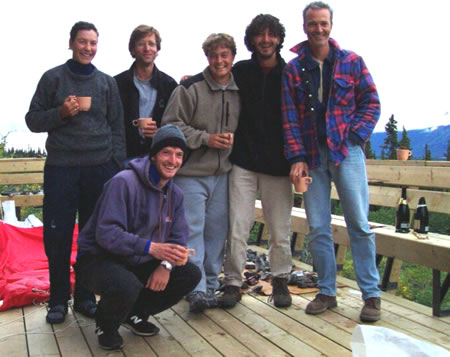
Nakina mapping project, Atlin, BC
Radiolarian chert and other rock samples in the background... From left to right: Fionnula Devine (Nulaaa), Mitch Mihalynuk (mad dog), Joe English (Shamrock, front), Kyle Larson (pillow-talk), Yann Merran (Yann-le-gars), and FC (Fab)
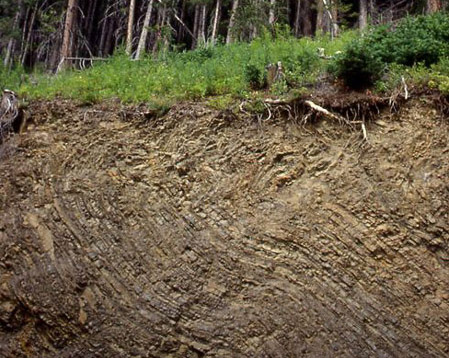
Similar
sections of x cm-size grey chert-shale couplets are found in Paleozoic
and Mesozoic North-American accretion-subduction complexes. Width: 3m (see also Cordey 2026 https://doi.org/10.1130/b38286.1).

Metamorphic ribbon chert on Red Mountain gold deposit near Stewart, BC/Alaska border.
Mapping by Charlie Greig and radiolarian collecting by FC on the larger gold deposit of British Columbia. Middle Triassic pyritized radiolarian fauna were recovered from this locality.
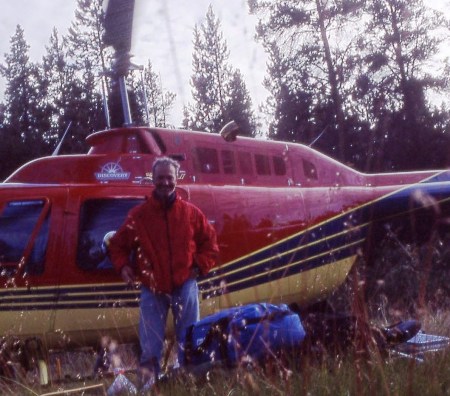
Early morning in the Cache Creek terrane
A tribute to Norm Graham, founder and pilot of Discovery helicopters (Atlin) almost visible inside the chopper!
Mapping by MaryAnne Bloodgood and Kim Ferry, BC Geological Survey Branch.
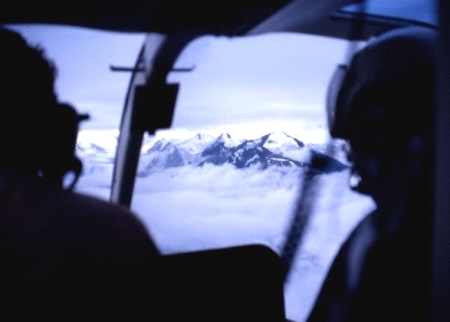
Flying over BC Coast Belt
Block of Devonian red radiolarian chert, Old Tom Formation / Apex Mtn Cx, Keremeos, British Columbia.
Dirk Tempelman-Kluit, former head of GSC Cordilleran division
Tracking chert outcrops along talus slopes! Old Tom Formation, Keremeos, British Columbia.
Bob Foreman on top of his game
Slabs of grey radiolarian chert, Middle Triassic, Bridge River Complex, Gold Bridge, British Columbia.
Tectonic style (metric-size panels, chevron folding) typical of accretionary complexes of the circumpacific regions in general and the Canadian Cordillera in particular.
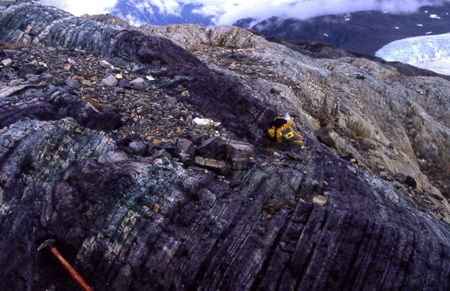
Varicoloured ribbon chert, Late Permian, Stikine terrane, near Red Mountain, Stewart, British Columbia.
Successions of apparently undisrupted ribbon chert are in fact tectonically duplicated by chevron folding (visible to left)
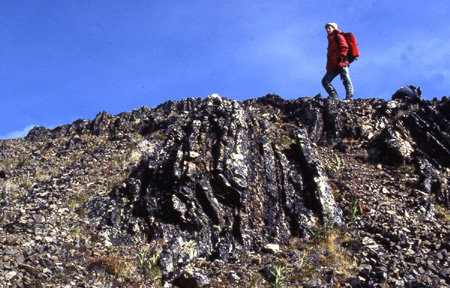
Grey ribbon chert, Cache Creek complex, Teslin plateau, southern Yukon.
Five to 10 m thick outcrops of Lower Jurassic pelagics and hemipelagics are the youngest strata of the Cache Creek belt.
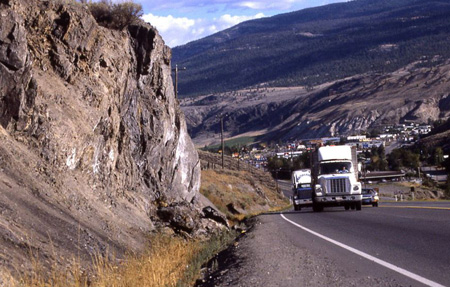
Cache Creek town site, type-locality, southern British Columbia.
Disrupted
outcrops of grey ribbon and limestone olistoliths of the Cache Creek melange
along the Trans-Canada highway
(Cordey F. 2020, http://dx.doi.org/10.1139/cjes-2019-0236)
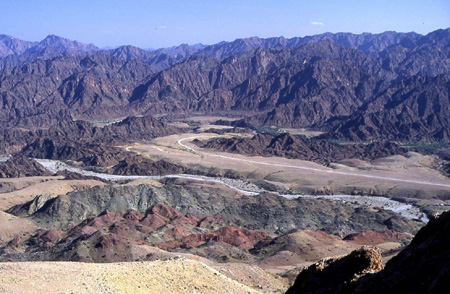
The Oman ophiolite and the Hawasina sedimentary units, Baid, Sultanate of Oman.
Nappes of mafics/ultramafics bodies (dark ruin-like units) are thrust (green units = metamorphic sole) onto red Cretaceous radiolarites of the Hawasina basin.
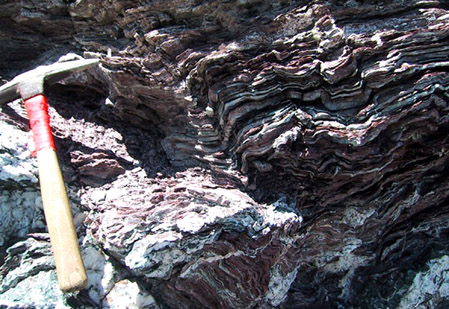
Red radiolarites from the Gondran cirque, Chenaillet ophiolite near Briançon, France.
This locality is associated with ultramafic rocks. Thin sections reveal highly recrystallized and elongated radiolarian shells. This locality has recently been dated as Middle Jurassic (tentatively mid. Bathonian)
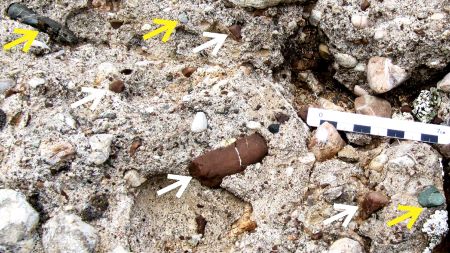
Chert and basalt pebbles in conglomerate, Karpathos island, Greece
Cordey and Quillévéré 2020, http://dx.doi.org/10.1017/S0016756819000657
White arrows: red chert; yellow arrows: basalt and prasinite. Conglomerates bearing remnants of magmatic rocks and radiolarian chert are found in many mountain ranges such as the Alpine chains and the circum-Pacific ranges. The chert pebbles can be dated and reveal the occurrence of oceanic units that are not found in situ anymore (ex: Cordey, Tricart, Guillot and Schwartz 2012)
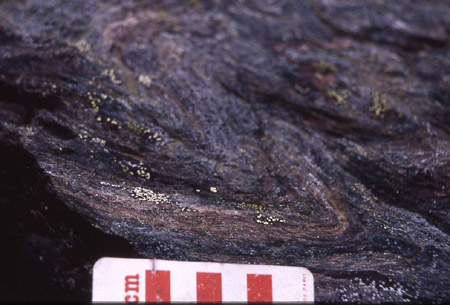
Locally, Paleozoic and Mesozoic ribbon chert successions from Cordilleran terranes display blueschists metamorphic facies, consistently with low T high P conditions of subduction complexes.
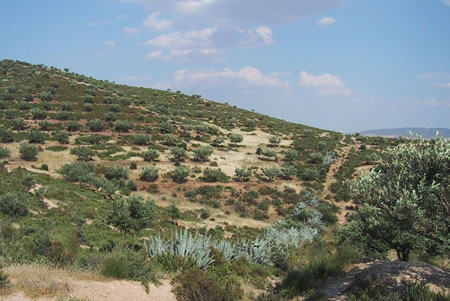
Siliceous series of the Jurassic Jedidi Formation, NW Tunisia.
Olive grove geology... Red chert is visible on the slope. These series are coeval to chert strata of Alpine internal
zones s.l.
Cordey et al. 2005, https://doi.org/10.1016/j.crte.2005.03.013
Boughdiri et al. 2007, https://doi.org/10.1007/s00015-007-1237-x
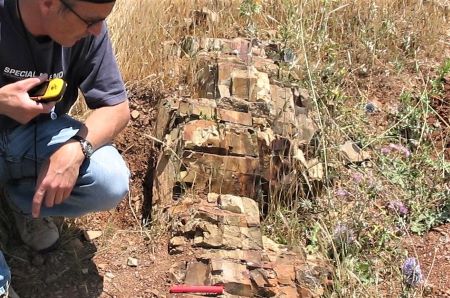
Siliceous series of the Jurassic Jedidi Formation, NW Tunisia.
These series are coeval to chert strata of Alpine internal
zones s.l.
Cordey et al. 2005, https://doi.org/10.1016/j.crte.2005.03.013
Boughdiri et al. 2007, https://doi.org/10.1007/s00015-007-1237-x
Late Jurassic red cherts from La Désirade Island (Guadeloupe, Lesser Antilles)
Thin radiolarites and jasper interbedded with pillow basalt flows (Cordey and Cornée 2009, https://doi.org/10.2113/gssgfbull.180.5.399)
Late Jurassic basalt and radiolarian chert from La Désirade Island (Guadeloupe, Lesser Antilles)
Basaltic pillow encased within radiolarian chert (Cordey and Cornée 2009, https://doi.org/10.2113/gssgfbull.180.5.399)
Late Jurassic basalt and radiolarian chert from La Désirade Island (Guadeloupe, Lesser Antilles)
Section of basalt flow and interpillow spaces filled with red radiolarian ooze (Cordey and Cornée 2009, https://doi.org/10.2113/gssgfbull.180.5.399)
Late Jurassic basalt and radiolarian chert from La Désirade Island (Guadeloupe, Lesser Antilles)
Thin radiolarian chert layer interbedded within basalt flows. Vincent Grossi (University Aix-Marseille) is a good 1.90 m scale.
Middle-Late Jurassic chert succession of the Pindos-Olonos series (Karpenission area, Pindos mountains, Greece)
These well-preserved series are typical of Alpine Jurassic radiolarite successions locally associated with ophiolites.
Early Cretaceous serpentinites and sedimentary cover in Karpathos (Dodecanese, Greece)
Nodular red chert layers interbedded with micritic limestones led to establish the age of ophiolitic rocks exposed in the island (Cordey and Quillévéré 2020,http://dx.doi.org/10.1017/S0016756819000657)
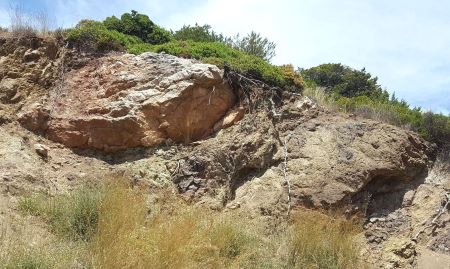
Blocks of ophiolitic rocks, limestone and chert define the "Kopria ophiolitic melange" on the island of Rhodes (Greece)
Ages obtained on the blocks ranging from the Carboniferous to the Late Cretaceous bring new insights on the sources of the melange and the tectonic history of the Aegean forearc (Cordey 2022, https://doi.org/10.4454/ofioliti.v47i1.551)
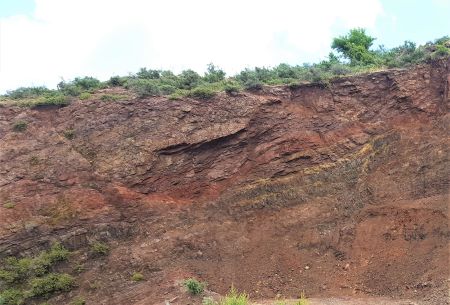
Red radiolarites from Gonies area, Crete.
These series are associated with ophiolitic rocks and are considered to be coeval and of similar paleogeographic setting than the Pindos units of continental Greece (height of picture: 15 m).